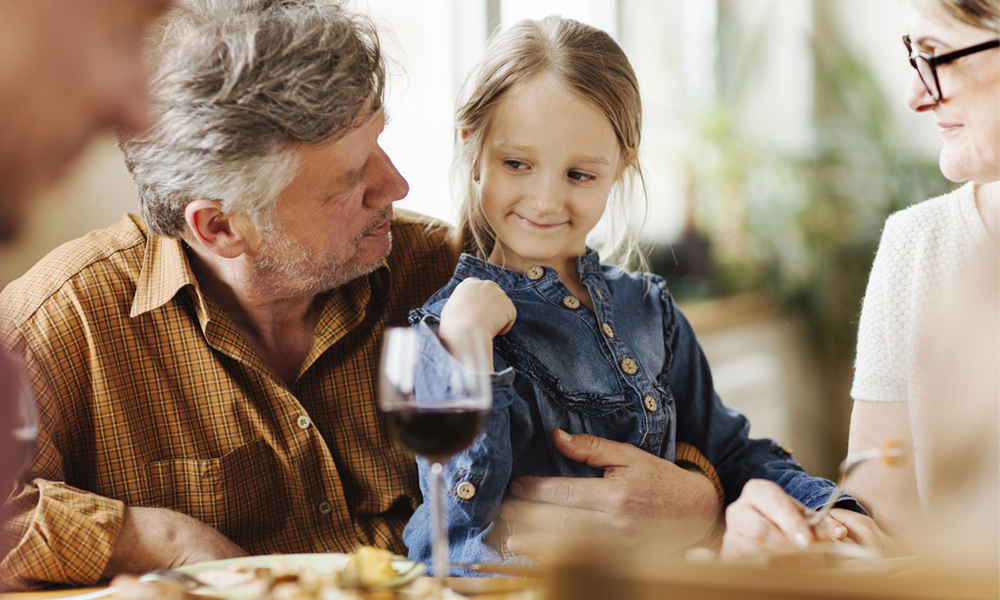Susan left the dining room to get more gravy for the turkey her family was enjoying. Upon returning, she was shocked to find her five-year-old son Jason lifting her wine glass to his lips, unnoticed by the rest of her chattering family. She had always told him alcohol was for grown-ups and figured that was sufficient discussion until he was a teenager. Was five too young to talk more openly about drinking to her child?
We know kids are always watching us, drinking in our words and behaviours—but often we mistakenly assume our “adult beverages” won’t appeal to them. It’s a natural and healthy curiosity, but also one we can’t ignore.
According to a 2015 report by Canada’s Chief Public Health Officer, almost twenty percent of Canadian kids in Grade eight admitted to alcohol use and sixty percent of kids between Grades six to ten believed there is “little harm” to drinking alcohol occasionally. Like so many other things we want to prepare kids for in their adult life—healthy sexuality, academic performance, responsibility—we need to acknowledge that early discussions about alcohol are one of the best ways to ensure our children grow up to be responsible in their consumption.
So how do we say what needs to be said? Here are some do’s and don’ts to help those conversations:
DO explain to children that alcohol is a beverage consumed responsibly by adults only. It’s ok to discuss the dangers—and pleasures—of alcohol, even with young children, in age-appropriate language and level of detail. Ensure kids know the added dangers of drinking alcohol—like negatively affecting brain development and growth—before they are adults.
DO make quick, age-appropriate comments in situations where they are relevant, instead of having big speeches where a child’s attention span will wander. For example, if you’re en route to a family party you might say, “Mommy and Daddy are discussing who will drive home because it’s very dangerous and against the law to drive when you’ve had too much alcohol. Drinking alcohol changes how you see, think and feel. Depending on how a person’s body reacts to alcohol, generally, the safest choice is to not have any if you are going to drive, or just one. Only one of us is going to drink alcohol responsibly at the party and the other person will be what’s called the designated driver, who doesn’t drink at all or has just one, to ensure they can drive safely.”
DO model responsible drinking habits. Kids watch, learn and imitate our actions far more than they listen and learn.
DO ensure most of your comments or discussions about alcohol consumption are held with only immediate family members present. Too many participants can be distracting and you can lose control of the message you want your kids to receive with multiple adults giving input.
DO ensure you haven’t had any alcohol when you discuss consumption with your kids. Even one drink can change the words you use, your demeanour and how well you respond to your kids’ questions.
DO discuss what peer pressure is and ways kids can avoid succumbing to friends trying to influence them to drink alcohol.
DON’T ignore your child’s interest in, or questions about, alcohol, including possible tough questions about the alcoholism of a friend or family member. Facilitate the same open, non-judgemental and honest conversations you do about all subjects.
DON’T let a child sampling alcohol become entertainment. Allowing a tiny sip once to satisfy their curiosity is different than offering a sip each time you have an alcoholic beverage and showing amusement. Kids love to repeat anything they think entertains adults.
DO avoid making comments about alcohol being medicinal or rewarding when children are listening. Sure, “wine o’clock” and “mommy’s grape juice” are fun euphemisms to share privately with friends or on social media, but kids don’t understand the joke.
DO discuss lifestyle advertising when your kids see or hear it. Kids can’t always distinguish that the utopian party world created by alcohol PR in movies, TV, magazines, and videos isn’t reality.
Every family has different boundaries concerning alcohol, but whether you’re abstainers or like to indulge regularly, most kids will have an interest in the subject that should be met with full and honest details. Alcohol doesn’t have to be painted as an evil force, but hopefully, if kids are armed with the correct information about what drinking responsibly means, they will do just that when the time is right.

Leave a Reply